GloCal Fellows 2022-2023
Mohamed Alimohamed, Muhimbili University of Health and Allied Sciences (MUHAS)
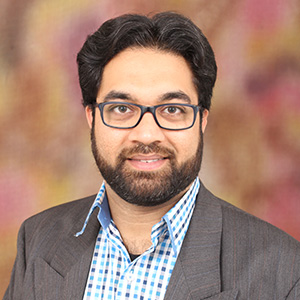 Mohamed Z. Alimohamed, MS, PhD, is a Lecturer at the Department of Haematology and Blood Transfusion and Department of Biochemistry (MUHAS), as well as a Research Fellow and lead investigator in the Sickle Cell Programme (SCP). His current research interests and work include investigating curative options (gene editing and therapy) as part of advanced therapy treatment for patients with sickle cell disease (SCD) in Tanzania, antimicrobial resistance in Tanzanian communities, exploring genetic variations in African populations and surveillance of rare genetic disorders in Tanzania. He serves as the secretary general of the Tanzania Human Genetics Organization (THGO) that he co-founded in 2017. During the course of his PhD studies, his research mainly focused on using next generation sequencing to diagnose (genetic) diseases such as cardiomyopathy, spinocerebellar ataxia, cancer and acute leukemia and its implementation strategies. He is passionate to push the genetics and genomics agenda in his country, Tanzania.
Mohamed Z. Alimohamed, MS, PhD, is a Lecturer at the Department of Haematology and Blood Transfusion and Department of Biochemistry (MUHAS), as well as a Research Fellow and lead investigator in the Sickle Cell Programme (SCP). His current research interests and work include investigating curative options (gene editing and therapy) as part of advanced therapy treatment for patients with sickle cell disease (SCD) in Tanzania, antimicrobial resistance in Tanzanian communities, exploring genetic variations in African populations and surveillance of rare genetic disorders in Tanzania. He serves as the secretary general of the Tanzania Human Genetics Organization (THGO) that he co-founded in 2017. During the course of his PhD studies, his research mainly focused on using next generation sequencing to diagnose (genetic) diseases such as cardiomyopathy, spinocerebellar ataxia, cancer and acute leukemia and its implementation strategies. He is passionate to push the genetics and genomics agenda in his country, Tanzania.
Project
Isolation, Quantification and Cryopreservation of CD34 Positive Cells from Cord Blood Samples – Methods Validation in Tanzania
Currently, the only curative option for SCD is allogenic hematopoietic stem cell transplantation. While the process is highly successful, there is limited availability in finding matched sibling donors as well as the high risk of transplantation related side effects. This has led scientists around the world to explore alternative curative options such as ex vivo gene therapy which has been shown to carry a great potential for cure. These techniques are however still in the early stages of research where issues such as safety and efficacy remain to be addressed before employing them in clinical practice. This makes the case for increasing scientific studies in Tanzania and Africa in general where the burden is high, to invest and keep par with the developed countries. The development of laboratory-based pipelines is strongly needed to establish the foundations of advanced therapy for sickle cell disease, particularly gene-based therapy as a potential curative option in Tanzania.
Mentors: Mark Walters, MD (UCSF), Julie Makani, MD, PhD, (MUHAS), Siana Nyka, PhD, MS (MUHAS)
Nathan Brand, UCSF
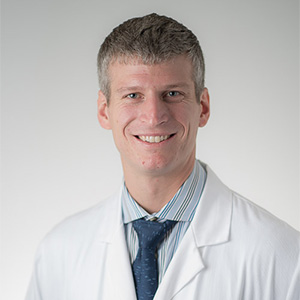 Nathan Brand, MD, MS is a general surgery resident at University of California, San Francisco. As a medical student at Columbia University, Dr. Brand spent a year living in Nairobi, Kenya working for the U.S. National Cancer Institute supporting the Ministry of Health in the writing of their National Cancer Control Strategy. Now that Dr. Brand has matched into general surgery residency, he has partnered with mentor Dr. Larry Akoko at Muhimbili University for Health and Allied Sciences (MUHAS) to study access and capacity of surgical oncology services in Tanzania. After completing residency, Dr. Brand plans to pursue a fellowship in colon and rectal surgery and continue working on strengthening surgical systems in Tanzania.
Nathan Brand, MD, MS is a general surgery resident at University of California, San Francisco. As a medical student at Columbia University, Dr. Brand spent a year living in Nairobi, Kenya working for the U.S. National Cancer Institute supporting the Ministry of Health in the writing of their National Cancer Control Strategy. Now that Dr. Brand has matched into general surgery residency, he has partnered with mentor Dr. Larry Akoko at Muhimbili University for Health and Allied Sciences (MUHAS) to study access and capacity of surgical oncology services in Tanzania. After completing residency, Dr. Brand plans to pursue a fellowship in colon and rectal surgery and continue working on strengthening surgical systems in Tanzania.
Project
Assessment of Current Surgical Oncology Case Volume, Capacity, and Priorities in Tanzania
The overall goal of Dr. Brand’s research is to provide an assessment of the access, distribution, and capacity of cancer surgery in Tanzania. Specifically, he aims to 1) qualitatively assess Tanzanian providers’ ability to provide surgical oncology care in the country, 2) describe the current capacity of public sector hospitals within Tanzania to provide surgical oncology care, and 3) estimate the national surgical oncology case volume and characterize the geographic distribution of surgical oncology cases by disease site, location, and treatment intent. Successful completion of this project will provide crucial baseline data for the ongoing implementation of Tanzania’s National Surgical Obstetrics and Anesthesia Plan by informing the Ministry of Health about the distribution of surgical oncology services within the public sector of Tanzania.
Mentors: Doruk Ozgediz, MD, MSc (UCSF), Larry Akoko, MD (MUHAS), Cameron Gaskill, MD, MPH (UC Davis)
Binh Cao, UCSF
 Binh Cao is a medical student at UCSF School of Medicine. Before immigrating to the US, he received medical training in Vietnam, where he volunteered on multiple medical mission trips to help deliver health care in rural areas. He received a degree in microbiology from California State University East Bay in 2019, where he had developed an interest in biomolecular techniques and infectious diseases. At UCSF, he participated in a global health project in Vietnam to study the diagnostic accuracy of point-of-care CRP testing in TB screening, and became passionate about global health. He was then fascinated by eye diseases during his clinical clerkship. His long-term career goal is to become an academic global health researcher dedicated to studying cost-effective interventions that would help prevent blindness in resource-limited settings and worldwide.
Binh Cao is a medical student at UCSF School of Medicine. Before immigrating to the US, he received medical training in Vietnam, where he volunteered on multiple medical mission trips to help deliver health care in rural areas. He received a degree in microbiology from California State University East Bay in 2019, where he had developed an interest in biomolecular techniques and infectious diseases. At UCSF, he participated in a global health project in Vietnam to study the diagnostic accuracy of point-of-care CRP testing in TB screening, and became passionate about global health. He was then fascinated by eye diseases during his clinical clerkship. His long-term career goal is to become an academic global health researcher dedicated to studying cost-effective interventions that would help prevent blindness in resource-limited settings and worldwide.
Project
Clinic-based molecular diagnostics for fungal and acanthamoeba keratitis
Fungal keratitis and acanthamoeba keratitis are corneal infections that disproportionately affect tropical and subtropical countries. The current microbiologic diagnostic paradigm (i.e., culture and stain) leads to a delay in diagnosis, which contributes to especially poor visual outcomes of these conditions. Molecular techniques like quantitative polymerase chain reaction (qPCR) and loop-mediated isothermal amplification (LAMP) can provide accurate and faster diagnosis for fungal and acanthamoeba keratitis but have not been evaluated in clinic-based settings. Mr. Cao's project will evaluate diagnostic accuracy (i.e., sensitivity and specificity) and time to diagnosis of clinic-based qPCR and LAMP point-of-care tests for fungal and acanthamoeba keratitis at an ophthalmology clinic of Vietnam National Eye Hospital. He hypothesizes that the two molecular tests will provide an accurate diagnosis sooner than standard microbiology.
Mentors: Jeremy Keenan, MD, PhD (UCSF), Cung Le Xuan, MD (Hanoi Medical University), Hoang Viet Chi, MD (Hanoi Medical University), Thuy Doan, MD, PhD (UCSF)
Emily Hansman, UCLA
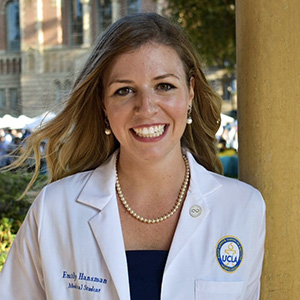 Emily Hansman is a medical student at the David Geffen School of Medicine at UCLA. She graduated from Harvard University in 2016, where she had spent time in Tanzania working to expand access to HIV testing. Subsequently, Ms. Hansman was selected as a 2016-2017 Princeton in Africa Fellow with Integrate Health in Togo, where she worked as a quality improvement fellow in the HIV/AIDS and maternal and child health programs. While at UCLA, Ms. Hansman has been part of the Global Health Equity Pathway and the Los Angeles Global Health Conference, in addition to conducting research on sexually transmitted screening in pregnancy. Ms. Hansman plans to pursue a career in Obstetrics and Gynecology and as an independent investigator in global health. Her interests lie in health systems strengthening to improve sexual, reproductive, and maternal health in underserved settings, both in the U.S. and globally.
Emily Hansman is a medical student at the David Geffen School of Medicine at UCLA. She graduated from Harvard University in 2016, where she had spent time in Tanzania working to expand access to HIV testing. Subsequently, Ms. Hansman was selected as a 2016-2017 Princeton in Africa Fellow with Integrate Health in Togo, where she worked as a quality improvement fellow in the HIV/AIDS and maternal and child health programs. While at UCLA, Ms. Hansman has been part of the Global Health Equity Pathway and the Los Angeles Global Health Conference, in addition to conducting research on sexually transmitted screening in pregnancy. Ms. Hansman plans to pursue a career in Obstetrics and Gynecology and as an independent investigator in global health. Her interests lie in health systems strengthening to improve sexual, reproductive, and maternal health in underserved settings, both in the U.S. and globally.
Project
Treatment of sex partners of pregnant women with STIs in a high HIV prevalence setting
In Botswana, infant mortality is 32 per 1000 live births, 3 times higher than the average for other upper-middle-income countries. Prematurity, intrauterine complications, and neonatal sepsis are together implicated in 38% of these deaths, and untreated sexually transmitted infections (STIs) during pregnancy, including HIV, are a known cause of such adverse outcomes. Identification and treatment of sex partners is essential for the successful management of STIs. However, a recent study in Gaborone found only 47% of partners received treatment. To address the high burden of STIs in pregnancy, insight into barriers to partner notification and treatment is essential. Ms. Hansman’s mixed methods study will explore the influence of HIV status and STI screening on partner notification and treatment outcomes and experiences among pregnant women with an STI, in order to equip health services with insight to better serve this population.
Mentors: Jennifer Wagman, PhD, MD (UCLA), Chelsea Morroni, MBChB, DFRH, MPH, PhD (Botswana Harvard AIDS Institute Partnership), Jeffrey Klausner, MD, MPH (University of Southern California)
Jonathan Izudi, Infectious Diseases Institute (IDI)
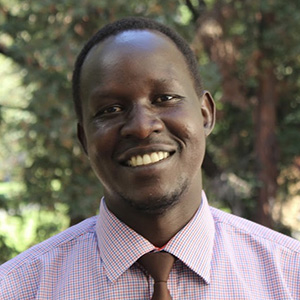 Jonathan Izudi, MPH, PhD, is a public health specialist focused on operational and implementation sciences research. He was a Fogarty D43 Postdoctoral Research Fellow in HIV and co-infections at the Infectious Diseases Institute (IDI), Makerere University, and a 2021 Impact Evaluation Fellow of the East African Social Sciences Translation Collaborative (EASST) at the Center for Effective Global Action, University of California, Berkeley, USA. He researches TB, HIV, and maternal health. His methodological and statistical expertise is in systematic reviews and meta-analyses, randomized and non-randomized experimental designs, and the application of advanced statistical methods for causal inference and impact evaluation. He is a recipient of the 2022 Charles Boucher Award for the highest scoring scientific abstract submitted at the 16th INTEREST International Conference on HIV treatment, pathogenesis, and prevention research in low-resource settings as well as the best presenter.
Jonathan Izudi, MPH, PhD, is a public health specialist focused on operational and implementation sciences research. He was a Fogarty D43 Postdoctoral Research Fellow in HIV and co-infections at the Infectious Diseases Institute (IDI), Makerere University, and a 2021 Impact Evaluation Fellow of the East African Social Sciences Translation Collaborative (EASST) at the Center for Effective Global Action, University of California, Berkeley, USA. He researches TB, HIV, and maternal health. His methodological and statistical expertise is in systematic reviews and meta-analyses, randomized and non-randomized experimental designs, and the application of advanced statistical methods for causal inference and impact evaluation. He is a recipient of the 2022 Charles Boucher Award for the highest scoring scientific abstract submitted at the 16th INTEREST International Conference on HIV treatment, pathogenesis, and prevention research in low-resource settings as well as the best presenter.
Project
Effectiveness of Intensive Adherence Counselling on Viral Load Suppression among Adolescents and Adults Living with HIV in Uganda: a Regression Discontinuity Design
In People Living with HIV (PLHIV) on first-line ART, optimal ART adherence leads to viral load suppression (VL<1000 copies/ml) within 6 months. For those with VL≥1,000 copies/ml after 6 months of ART, intensive adherence counseling (IAC) is recommended before a definitive diagnosis of treatment failure at 12 months and switch to second-line ART is reached. In Uganda, data regarding the impact of IAC on VL suppression are inconclusive. Previous studies lacked appropriate comparison groups and employed a design that precluded assessment of impact of IAC besides data inadequacy regarding factors influencing VL non-suppression after IAC completion. Among adolescents and adults on ART with VL 1,000 copies/ml at 6 months in Kampala, Uganda, Dr. Izudi will evaluate the impact of IAC on VL suppression and all-cause mortality at 12 months, examine risk factors for VL persisting at≥1,000 copies/ml at 12 months after completing IAC and, explore facilitators and barriers to VL suppression at 12 months after completing IAC.
Mentors: Rachel King, MPH, PhD (UCSF), Barbara Castelnuovo, MD, MS, PhD (IDI), Addithya Cattamanchi, MD, MAS (UCSF)
Tamara Jimah, UC Irvine
 Tamara Jimah, PhD, is a public health scientist and postdoctoral researcher at the University of California, Irvine (UC Irvine). She is currently working on a federally-funded research study that uses technology to promote the physical and emotional well-being of underserved perinatal women. Dr. Jimah is passionate about global health innovation and understanding factors that facilitate or hinder health behaviors in low-resource settings to better inform the development of effective interventions. She has worked in Africa in collaboration with academic institutions, local governments, international agencies, and community organizations on water and sanitation projects and national antibiotic stewardship programs. Dr. Jimah received her PhD in public health from UCI, MA in international development studies from Ohio University, and BS in economics from Voronezh State University.
Tamara Jimah, PhD, is a public health scientist and postdoctoral researcher at the University of California, Irvine (UC Irvine). She is currently working on a federally-funded research study that uses technology to promote the physical and emotional well-being of underserved perinatal women. Dr. Jimah is passionate about global health innovation and understanding factors that facilitate or hinder health behaviors in low-resource settings to better inform the development of effective interventions. She has worked in Africa in collaboration with academic institutions, local governments, international agencies, and community organizations on water and sanitation projects and national antibiotic stewardship programs. Dr. Jimah received her PhD in public health from UCI, MA in international development studies from Ohio University, and BS in economics from Voronezh State University.
Project
Promoting Women’s Health in South Africa: Enhancing TB Treatment Adherence among Female Patients with TB and HIV/TB Coinfection
Tuberculosis (TB) and human immunodeficiency virus (HIV) continue to be the leading causes of mortality in South Africa. Several factors, including low socio-economic status, delay in seeking care, and non-adherence to medication, contribute to poor treatment outcomes. Women are particularly affected due to existing gender-based inequities, low literacy rates, and limited financial autonomy. Furthermore, among women with TB, those living with HIV may face additional challenges due to HIV-related stigma. The current literature on the specific factors influencing TB treatment adherence among women is sparse. During her fellowship at the Desmond Tutu Health Foundation (DTHF), Dr. Jimah will integrate modified ecological momentary assessment methods with an electronic medication event-monitoring system to identify real-time and near real-time factors that influence TB treatment adherence behaviors among female patients living with and not living with HIV in South Africa's Eastern Cape Province.
Mentors: Sanghyuk Shin, PhD (UCI), Andrew Medina-Marino, PhD (DTHF), Joseph Daniels, PhD (Arizona State University)
Grant Murewanhema, University of Zimbabwe (UZ)
 Grant Murewanhema, MBChB, MMed, MPH is an Obstetrician-Gynecologist in the Department of Obstetrics and Gynaecology at the University of Zimbabwe (UZ), and an adjunct lecturer in Maternal and Child Health in the Department of Global Health. His work involves day-to-day provision of clinical services to patients at Sally Mugabe Hospital, and teaching medical students. He is a Chevening Scholarship alumnus, a researcher and an academic writer with over 50 peer-reviewed publications. He sits on FIGO’s Safe Abortion Committee, is the African Representative in the World Association of Trainees in Obstetrics and Gynaecology, and is the Deputy Chairperson of the Zimbabwe National Cervical Cancer Screening Taskforce. He is an Academic Editor for PLOS ONE and an Associate Editor for the Pan African Medical Journals. Currently, he is the co-investigator in a study evaluating the population level impact of HPV vaccination in Zimbabwe.
Grant Murewanhema, MBChB, MMed, MPH is an Obstetrician-Gynecologist in the Department of Obstetrics and Gynaecology at the University of Zimbabwe (UZ), and an adjunct lecturer in Maternal and Child Health in the Department of Global Health. His work involves day-to-day provision of clinical services to patients at Sally Mugabe Hospital, and teaching medical students. He is a Chevening Scholarship alumnus, a researcher and an academic writer with over 50 peer-reviewed publications. He sits on FIGO’s Safe Abortion Committee, is the African Representative in the World Association of Trainees in Obstetrics and Gynaecology, and is the Deputy Chairperson of the Zimbabwe National Cervical Cancer Screening Taskforce. He is an Academic Editor for PLOS ONE and an Associate Editor for the Pan African Medical Journals. Currently, he is the co-investigator in a study evaluating the population level impact of HPV vaccination in Zimbabwe.
Project
Characterization of the vaginal microbiome among pregnant women presenting to antenatal clinics in Harare, Zimbabwe
The balance of the vaginal microflora is involved in the complex process of sustaining the conceptus in utero and maintaining the pregnancy until term. Vaginal dysbiosis is associated with adverse pregnancy outcomes, including pregnancy wastage, preterm delivery, and an increased risk of acquisition of HIV and other sexually transmitted infections. Among women in Zimbabwe, the prevalence of bacterial vaginosis in pregnancy was previously noted to be very high at 32.6%. Understanding the composition of the vaginal microbiome in this population is a critical step in understanding the contributory factors to vaginal dysbiosis, to investigate the association between dysbiosis and adverse pregnancy outcomes, and to design interventions to reduce the adverse outcomes associated with dysbiosis. The objective of this study is therefore to characterize the vaginal microbiome among women presenting to antenatal clinics at Sally Mugabe and Parirenyatwa Hospitals as a baseline study.
Mentors: Zvavahera (Mike) Chirenje, MD, MSc, FRCOG (UCSF), Felix Godwin Mhlanga, MBChB, MMed (UZ), Joelle Brown, PhD (UCSF)
Caroline Ngimba, Muhimbili National Hospital (MNH)
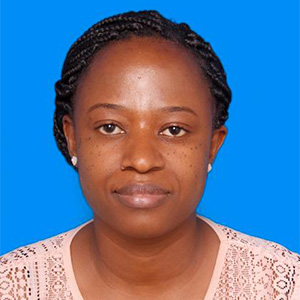 Caroline Ngimba, MD, MMed, is a staff pathologist at MNH, the largest national referral hospital in Tanzania and the affiliated teaching hospital for Muhimbili University of Health and Allied Sciences (MUHAS). She received her MD and MMed in anatomic pathology from MUHAS. Her work involves the provision of anatomical pathology services such as attending and reporting histology and cytology cases, performing autopsy, and supervising residents. Her previous experience in cancer research includes working as a data coordinator where she adapted the recently published Tanzanian National Cancer Treatment Guidelines into a smartphone application, AgileMD, with the goal of facilitating easy access to the reference guide as part of a larger project to increase adoption of these guidelines. She also worked as a study pathologist for the project that aimed to validate a point-of-care breast cancer biomarker test. She has interests in research that improves cancer diagnostic service in resource-limited settings.
Caroline Ngimba, MD, MMed, is a staff pathologist at MNH, the largest national referral hospital in Tanzania and the affiliated teaching hospital for Muhimbili University of Health and Allied Sciences (MUHAS). She received her MD and MMed in anatomic pathology from MUHAS. Her work involves the provision of anatomical pathology services such as attending and reporting histology and cytology cases, performing autopsy, and supervising residents. Her previous experience in cancer research includes working as a data coordinator where she adapted the recently published Tanzanian National Cancer Treatment Guidelines into a smartphone application, AgileMD, with the goal of facilitating easy access to the reference guide as part of a larger project to increase adoption of these guidelines. She also worked as a study pathologist for the project that aimed to validate a point-of-care breast cancer biomarker test. She has interests in research that improves cancer diagnostic service in resource-limited settings.
Project
Implementing primary high risk HPV (hrHPV) testing for cervical cancer screening in regional care and treatment clinics (CTCs) for women living with HIV (WLHIV) in Tanzania
Cervical cancer is the leading cause of cancer related mortality among women in Tanzania. Visual inspection by acetic acid (VIA) is the current modality used for cervical cancer screening in Care and Treatment Clinics (CTCs) among WLHIV in Tanzania. Primary cervical cancer screening with hrHPV at the CTCs will increase the early detection and treatment of precancerous lesions. Primary HPV screening introduces room for self-sampling thereby reducing barriers to screening such as number of intrusive pelvic examinations and personnel required for screening, as only those with positive hrHPV results will be referred for triage and treatment as per WHO recommendations. This project will conduct a formative evaluation of the contextual factors, facilitators, and barriers for adopting hrHPV testing as primary cervical cancer screening modality and develop an intervention strategy for implementation of primary cervical cancer screening using hrHPV testing among WLHIV on these clinics.
Mentors: Megan Swanson, MD, MPH (UCSF), Elia Mmbaga, MD, PhD (MUHAS), Dianna L. Ng, MD (UCSF)
Awirut Oon-arom, Chiang Mai University (CMU)
 Awirut Oon-arom, MD, is working as a psychiatrist and assistant professor in the Department of Psychiatry, Faculty of Medicine, CMU. After he received his MD from Ramathibodi Hospital at Mahidol University in Thailand in 2014, he received psychiatry training at Department of Psychiatry, CMU and then was certified in clinical practice in psychiatry by the Royal Collage of Psychiatrist of Thailand in 2018. Dr. Oon-arom’s research interests are substance use, suicide, co-occurring psychiatric disorders, and mental health in gender-diverse people, and their health consequences such as sexual health risks and HIV. He also collaborates with CMU Research Institute for Health Sciences on a project aimed to promote healthcare among university students by integrating knowledge of physical, mental, and sexual health. His career goal is to become an mHealth expert to address mental health problems in gender diverse people, focused on substance use and HIV across Thailand and Asia.
Awirut Oon-arom, MD, is working as a psychiatrist and assistant professor in the Department of Psychiatry, Faculty of Medicine, CMU. After he received his MD from Ramathibodi Hospital at Mahidol University in Thailand in 2014, he received psychiatry training at Department of Psychiatry, CMU and then was certified in clinical practice in psychiatry by the Royal Collage of Psychiatrist of Thailand in 2018. Dr. Oon-arom’s research interests are substance use, suicide, co-occurring psychiatric disorders, and mental health in gender-diverse people, and their health consequences such as sexual health risks and HIV. He also collaborates with CMU Research Institute for Health Sciences on a project aimed to promote healthcare among university students by integrating knowledge of physical, mental, and sexual health. His career goal is to become an mHealth expert to address mental health problems in gender diverse people, focused on substance use and HIV across Thailand and Asia.
Project
Sexualized drug use among men who have sex with men (MSM) and the HIV pre-exposure prophylaxis care continuum in Thailand
Thailand has one of the highest prevalences of HIV in the Asia-Pacific region. HIV prevalence is highest among MSM. Although rates of new HIV infection among MSM are increasing, efforts to improve access to PrEP have been slow. Sexualized drug use (SDU) or chemsex increases HIV risk. The use of alcohol and drugs decreases inhibition, and associated with condomless intercourse, sex with multiple partners, higher frequency of sexual activity, and sexually transmitted infections. Greater exposure to these and other psychosocial syndemics is associated with HIV transmission and poor adherence to HIV treatment. Since smartphone dating app use is associated with SDU and is commonly use in Thailand, mobile health interventions to improve PrEP retention may be useful tools for MSM with SDU. Dr. Oon-arom’s research will focus on the effects of SDU among MSM and the HIV PrEP care continuum in Thailand with exploration of the potential role of mobile health interventions for PrEP.
Mentors: David Grelotti, MD (UCSD), KriengKrai Srithanaviboonchai, MD (CMU), Sung-Jae Lee, PhD (UCLA)
Rose Paneno, UCLA
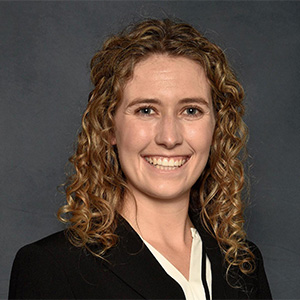 Rose Paneno is a medical student at David Geffen School of Medicine (UCLA). She received a Bachelor’s of Arts in biology and social welfare from UC Berkeley. Ms. Paneno is dedicated to advancing accessibility and quality of health care provision globally through community health workers (CHWs). Prior to matriculation at UCLA, she worked with organizations in Uganda and Zambia to facilitate training, data collection, and bolster institutional support of CHWs. While at UCLA, she founded LA Health Volunteer Corps and orchestrated local COVID-19 relief efforts. She has also participated in qualitative research highlighting provider and CHW prioritization of client needs utilizing Street Level Bureaucracy framework. Ms. Paneno is deeply interested in conducting research to inform community-driven interventions and strengthen health care delivery systems in disaster situations. She aspires to be a practicing physician and global health researcher focused on improving health system resiliency.
Rose Paneno is a medical student at David Geffen School of Medicine (UCLA). She received a Bachelor’s of Arts in biology and social welfare from UC Berkeley. Ms. Paneno is dedicated to advancing accessibility and quality of health care provision globally through community health workers (CHWs). Prior to matriculation at UCLA, she worked with organizations in Uganda and Zambia to facilitate training, data collection, and bolster institutional support of CHWs. While at UCLA, she founded LA Health Volunteer Corps and orchestrated local COVID-19 relief efforts. She has also participated in qualitative research highlighting provider and CHW prioritization of client needs utilizing Street Level Bureaucracy framework. Ms. Paneno is deeply interested in conducting research to inform community-driven interventions and strengthen health care delivery systems in disaster situations. She aspires to be a practicing physician and global health researcher focused on improving health system resiliency.
Project
Assessing the individual and health system factors influencing community health worker role-shift in response to El Niño Costero and COVID-19 Disasters in Lima and Piura, Peru: a mixed method, cross sectional analysis.
Ms. Paneno’s project will utilize a cross-sectional mixed methods study design to assess the relationship between community health worker disaster response, mental health, resiliency, social stigma, and health system integration in Lima and Piura, Peru. The overall aims of this proposed research are: (1) to explore mental health outcomes, resiliency, and level of COVID-19 response engagement among community health workers (2) Identify internal and external factors (mental health, resiliency, social stigma, and health system integration) that contributed to degree of role-shift to disaster response, and (3) to evaluate community social stigma towards community health workers following pandemic response. Findings from this preliminary data will potentially identify strengths and vulnerabilities within the current Peruvian CHW pandemic response and inform similar projects globally by highlighting strategies for optimal mobilization of CHWs in disaster response.
Mentors: Bonnie N. Kaiser, PhD (UCSD), Miya Barnett, PhD (UCSB), Lillian Walkover, PhD (UCSD), Andrés Lescano, PhD (UPCH), Kathryn Dovel, PhD (UCLA)
Karla Rascon-Garcia, UC Davis
 Karla Rascon-Garcia, PhD, is an infectious disease epidemiologist, network science modeler and postdoctoral fellow at the University of California, Davis. With a background in animal science, her research focuses on modeling infectious disease transmission(s) through methods ranging from network science, spatial risk assessments, and exponential random graph modeling, to latent class methods and agent-based modeling of infectious pathogens. Though quantitative in training, she insists on remaining empathetically driven to impact the human and animal lives behind the numbers. People most affected by disparities are her motivation, and her love for animal health coding are the avenue through which she offers her contributions to veterinary public health, locally and internationally.
Karla Rascon-Garcia, PhD, is an infectious disease epidemiologist, network science modeler and postdoctoral fellow at the University of California, Davis. With a background in animal science, her research focuses on modeling infectious disease transmission(s) through methods ranging from network science, spatial risk assessments, and exponential random graph modeling, to latent class methods and agent-based modeling of infectious pathogens. Though quantitative in training, she insists on remaining empathetically driven to impact the human and animal lives behind the numbers. People most affected by disparities are her motivation, and her love for animal health coding are the avenue through which she offers her contributions to veterinary public health, locally and internationally.
Project
Improving Nagana and Sleeping Sickness prevention and control efforts in Uganda: A multi-armed framework for a dually inflicted nation
Human and Animal African Trypanosomiasis (HAT & AAT, respectively), caused by a range of Trypanosoma species, are transmitted by Glossina species across most parts of arable sub-Saharan Africa. Both Trypanosoma brucei rhodesiense (acute sleeping sickness - rHAT) and T. brucei gambiense (chronic sleeping sickness - gHAT) infections are fatal unless properly treated. T. b. rhodesiense and T. b. gambiense have been spatially divergent with gHAT in Central and West Africa, and rHAT in Eastern and Southern Africa. Spatial trends hold except in Uganda where rHAT and gHAT are co-endemic. The goal of this study is to contribute prevalence estimates and identify risk factors: 1) First, by conducting meta-analyses for AAT and HAT prevalence estimates and risk factors in Uganda. 2) Second, by network analysis and exponential random graph modelling (ERGM) to identify key transmission/reservoir nodes and evaluate district-level attributes that should be targeted for disease control.
Mentors: Beatriz Martinez Lopez, DVM, PhD, MPVM (UC Davis), Dennis Muhanguzi, PhD (Makerere University), Caterina Scoglio, DEng (Kansas State University)
Daniel Vladimir Eid Rodríguez, Universidad Católica Boliviana
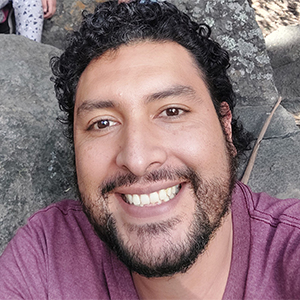 Daniel Vladimir Eid Rodríguez received his PhD in public health at Umea University in Sweden with a project aimed to assess and improve health care access to patients with leishmaniasis in remote rural areas of the Bolivian rainforest. For 18 years, he has been participating in epidemiological studies on health and aging among the Tsimane, an indigenous group with a relatively traditional lifestyle. Despite high inflammation, Tsimane carry a low burden of dementia, atherosclerosis, hypertension, diabetes and obesity. Yet their environment and living conditions coupled with limited health care access bear witness to a high risk of treatable health problems that lead to disability and death. Dr. Rodríguez’ work during these years combined research with the improvement of their access to health care. His next step is to better understand the myriad of factors affecting the health of elders, including the role of relatives as caregivers, with the goal of developing interventions for elders’ well-being.
Daniel Vladimir Eid Rodríguez received his PhD in public health at Umea University in Sweden with a project aimed to assess and improve health care access to patients with leishmaniasis in remote rural areas of the Bolivian rainforest. For 18 years, he has been participating in epidemiological studies on health and aging among the Tsimane, an indigenous group with a relatively traditional lifestyle. Despite high inflammation, Tsimane carry a low burden of dementia, atherosclerosis, hypertension, diabetes and obesity. Yet their environment and living conditions coupled with limited health care access bear witness to a high risk of treatable health problems that lead to disability and death. Dr. Rodríguez’ work during these years combined research with the improvement of their access to health care. His next step is to better understand the myriad of factors affecting the health of elders, including the role of relatives as caregivers, with the goal of developing interventions for elders’ well-being.
Project
Unveiling care needs of elders among indigenous Amazonians of Bolivia: A novel approach using a mixed method design
Older indigenous people (i.e. elders) have poorer health compared to their non-indigenous counterparts and face unique challenges affecting their well-being. The study population are the Tsimane, an isolated indigenous group still practicing traditional livelihood farming, fishing and hunting. This lifestyle is challenging for disabled elders given that hunting and farming require substantial strength and endurance. By age 60, Tsimane elders show substantial hearing loss, visual impairment, and other deficits. These functional disabilities make elders dependent on their families to survive, a situation rife with tension. The project aims to identify associated factors with functional dependence, and explore social consequences of functional decline, coping mechanisms, and patterns of caregiving. This project will contribute to the knowledge of cross-cultural aspects of eldercare including physical, social, and emotional well-being, as well as, to starting interventions to address their needs.
Mentors: Ladson Hinton, MD (UC Davis), Mariana Santa Cruz Terrazas, PhD (Universidad Católica Boliviana), Michael Gurven, PhD (UCSB)
Marguerite Thorp, UCLA
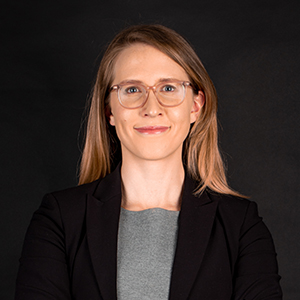 Marguerite Thorp, MD, MPA/ID, is a postdoctoral fellow in the Division of Infectious Diseases at the University of California Los Angeles (UCLA) David Geffen School of Medicine. She studies the impact of mobility and migration on access to HIV care in Malawi and Kenya. Prior to her GloCal fellowship, Dr. Thorp was a T32 postdoctoral fellow in Global HIV Prevention at UCLA. She completed residency in Internal Medicine & Pediatrics at UCLA after obtaining an MD and an MPA in international development (MPA/ID) from Harvard University. She previously served as national organizer for the Student Global AIDS Campaign, research assistant to Dr. Paul Farmer, and a policy analyst for Health GAP. She is passionate about empowering highly mobile and migratory people and ensuring their access to high-quality healthcare. She will be affiliated with Partners in Hope (PIH) in Lilongwe, Malawi, and also collaborates with researchers from the Kenya Medical Research Institute (KEMRI).
Marguerite Thorp, MD, MPA/ID, is a postdoctoral fellow in the Division of Infectious Diseases at the University of California Los Angeles (UCLA) David Geffen School of Medicine. She studies the impact of mobility and migration on access to HIV care in Malawi and Kenya. Prior to her GloCal fellowship, Dr. Thorp was a T32 postdoctoral fellow in Global HIV Prevention at UCLA. She completed residency in Internal Medicine & Pediatrics at UCLA after obtaining an MD and an MPA in international development (MPA/ID) from Harvard University. She previously served as national organizer for the Student Global AIDS Campaign, research assistant to Dr. Paul Farmer, and a policy analyst for Health GAP. She is passionate about empowering highly mobile and migratory people and ensuring their access to high-quality healthcare. She will be affiliated with Partners in Hope (PIH) in Lilongwe, Malawi, and also collaborates with researchers from the Kenya Medical Research Institute (KEMRI).
Project
Mobility, ART retention, and viral suppression among men experiencing treatment interruption in Malawi
Mobility is associated with poor outcomes at all stages of the HIV treatment cascade, but it is also an essential livelihood strategy for people living with HIV in sub-Saharan Africa. Mobility’s association with unsuppressed viral load is especially concerning both for the health of mobile individuals and because of the implication for epidemic control. To help mobile people protect their own health and the health of their partners, it is essential to understand different types of mobility and its consequences for retention in HIV care. The IDEaL and Engage trials, conducted in six districts throughout Malawi, are currently testing several interventions to improve retention and viral suppression among men. This study will examine the role of mobility in trial outcomes by combining qualitative research on participants’ experiences of mobility with quantitative analysis of trial endpoints.
Mentors: Kathryn Dovel, PhD, MPH (UCLA), Sam Phiri, PhD (PIH), Risa Hoffman, MD, MPH (UCLA)
